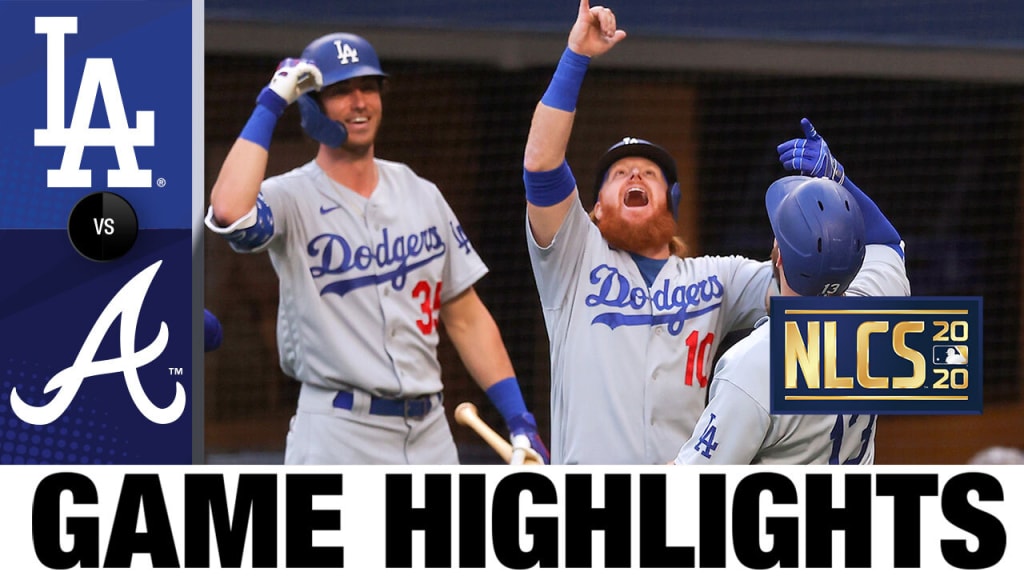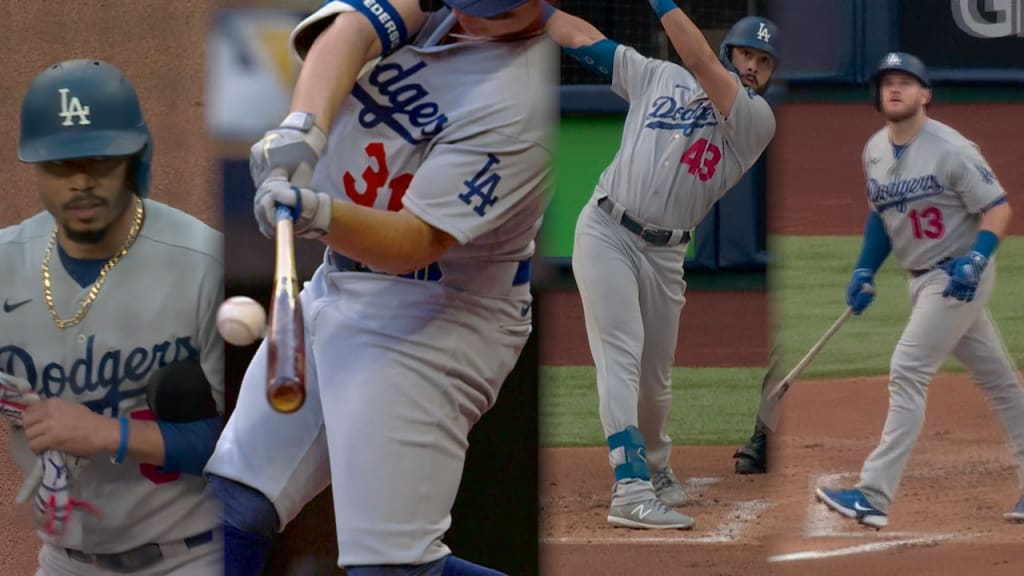15 stats, facts from NLCS Game 3 stunner
This browser does not support the video element.
The Dodgers entered Wednesday night as the only team in the Majors not to have lost three consecutive games in 2020.
That impressive factoid remained true after L.A.'s offense exploded for a historic first inning and kept rolling in a 15-3 victory over the Braves in Game 3 of the National League Championship Series at Globe Life Field. With the win, the NL West champions took the first step toward attempting to become the 14th team to rally from an 0-2 hole in a best-of-seven postseason series.
| Game | Date | Result | Highlights |
|---|---|---|---|
| Gm 1 | Oct. 12 | ATL 5, LAD 1 | Watch |
| Gm 2 | Oct. 13 | ATL 8, LAD 7 | Watch |
| Gm 3 | Oct. 14 | LAD 15, ATL 3 | Watch |
| Gm 4 | Oct. 15 | ATL 10, LAD 2 | Watch |
| Gm 5 | Oct. 16 | LAD 7, ATL 3 | Watch |
| Gm 6 | Oct. 17 | LAD 3, ATL 1 | Watch |
| Gm 7 | Oct. 18 | LAD 4, ATL 3 | Watch |
Meanwhile, it was a resounding end to a spectacular streak for the Braves, who fell one win short of tying the 2014 Royals’ record of eight consecutive victories to begin a postseason.
Here are 15 more facts and figures to know about Game 3:
Dodgers’ frenetic first
1. The Dodgers became the first team to score 11 runs in any inning of a postseason game when they took an 11-0 lead in the top of the first. The previous record was 10 runs, which had been done four times.
Amazingly, one of those came against the Braves last season. That was in a winner-take-all Game 5 of the NL Division Series against the Cardinals, who scored 10 in the top of the first. Not surprisingly, the Braves are now the first team to allow 10 or more runs in an inning multiple times in postseason play.
2. How long had it been since the Dodgers scored 11 or more runs in a single inning, according to the Elias Sports Bureau? So long that the franchise had not even moved to Los Angeles yet. The date was Aug. 8, 1954, and the place was Brooklyn’s Ebbets Field. The Dodgers were hosting the Reds and plated 13 runs in the eighth inning to blow open a 7-5 game behind the bats of Gil Hodges, Pee Wee Reese and Jackie Robinson, among others.
This browser does not support the video element.
3. Oddly enough, the Braves have now been involved in the two highest-scoring innings of 2020. On Sept. 9, however, they were the ones doing the bashing, putting together an 11-run second inning in a 29-9 rout of the Marlins.
4. The Dodgers went deep three times in the first inning, courtesy of Joc Pederson (three-run shot), Edwin Ríos (solo) and Max Muncy (grand slam). It was the first time in postseason history that a team homered three times in the first inning of a game.
This browser does not support the video element.
5. The Dodgers earned that big inning with some seriously loud contact. Each of the three home runs, plus doubles by Corey Seager and Will Smith, had an exit velocity of 105 mph or harder. It was the first time since Statcast began tracking in 2015 that a team had five base hits of 105-plus mph in the same inning.
The rout was on
6. The Dodgers finished with 15 runs, the most in a postseason game in franchise history. Their prior record had been 13, in the 2013 NLDS Game 3, also against the Braves, and the 1956 World Series Game 2 against the Yankees.
This was only the 13th time in postseason history that any team scored at least 15 runs in a game, and the Dodgers tied the NLCS record set by the Braves in a 15-0 win over the Cardinals in Game 7 of the 1996 NLCS.
This browser does not support the video element.
7. The Dodgers’ 15 runs all came in the first three innings, the most runs through three innings by a team in any postseason game.
8. The Dodgers won by 12 runs, marking the largest win in a postseason game in franchise history. The prior record had been an 11-run win in the 1974 NLCS Game 4 against the Pirates, when the Dodgers won, 12-1. The only other time the Dodgers have won by 10 runs was the 2017 NLCS Game 5 against the Cubs, 11-1.
This browser does not support the video element.
Braves’ shutdown pitching hits a wall
9. The scoring binge was all the more impressive because of how dominant the Braves’ pitching had been throughout this postseason. Over Atlanta’s first seven games, its pitchers gave up a total of 13 runs. But the majority of those came during the Dodgers’ furious rally late in Tuesday’s Game 2. Here is how the Braves’ postseason pitching breaks down, with the dividing line being the seventh inning of Game 2:
First 64 IP: 6 runs allowed
Next 6 IP: 22 runs allowed
This browser does not support the video element.
10. Braves starting pitchers had allowed just five runs in 38 2/3 innings across those first seven games, including six scoreless frames from Kyle Wright in Game 3 of the NLDS against the Marlins. But in Wright’s outing Wednesday, he gave up more runs (seven) while recording just two outs.
11. For Wright, a 25-year-old rookie right-hander, it was a night to forget. He became the first starting pitcher in postseason history to allow at least seven runs without escaping the first inning. Of the three previous starters to allow at least six runs and not make it out of the first in a playoff game, one was Atlanta’s Mike Foltynewicz in Game 5 of last year’s NLDS.
This browser does not support the video element.
12. It wasn’t just Wright, though. Lefty Grant Dayton relieved him and ultimately was charged with eight earned runs in two innings. He became the fourth reliever in postseason history to give up that many earned runs, and the first since the Yankees’ Jay Witasick in Game 6 of the 2001 World Series against the D-backs.
13. The only other team in postseason history to have multiple pitchers allow at least seven earned runs was the Indians in Game 4 of the 1999 ALDS against the Red Sox. With Boston setting a playoff record for runs and run differential in a 23-7 win, Cleveland saw both starter Bartolo Colon (seven runs) and reliever Steve Reed (eight) get shelled.
Silver linings
14. Rookie outfielder Cristian Pache homered for one of three Braves runs in the game. Pache, who played just two games in the 2020 regular season, his first in the Majors, had never hit a home run before Game 3. He’s the seventh player to hit his first career home run in the postseason, and just the third non-pitcher to do so, according to the Elias Sports Bureau. The last player to do it was pitcher Joe Blanton in 2008. The position players to do it were Melvin Mora in 1999 and Frank Demaree in ‘32.
Pache (21 years, 330 days old) became the fourth Braves player to homer in a postseason game at age 21 or younger, joining Andruw Jones, Ronald Acuña Jr. and Brian McCann.
This browser does not support the video element.
15. Huascar Ynoa helped save the Braves’ bullpen after Wright and Dayton struggled, soaking up four innings and not allowing a run. The only other time in franchise history that a pitcher threw at least four scoreless innings in relief was in Game 5 of the 1948 World Series against the Indians. With the Braves facing elimination, Hall of Famer Warren Spahn came out of the bullpen to throw 5 1/3 scoreless innings for the win.
This browser does not support the video element.


